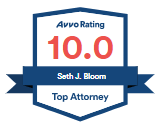What Does Homeowners Insurance Cover After a Hurricane?
Think Your Hurricane Damage Is Covered? Here’s What Homeowners Insurance Really Pays For in Louisiana
When a hurricane hits Southeast Louisiana, the impact on your home can be devastating. Wind, rain, flooding, and flying debris can cause extensive and expensive damage in just a few hours. For homeowners in high-risk areas like New Orleans, Metairie, and across parishes like Jefferson and St. Tammany, understanding what your insurance actually covers after a hurricane is crucial.
Homeowners’ insurance is supposed to offer peace of mind. But in reality, coverage often depends on policy specifics, storm classifications, and how insurers interpret your claim. So, what does your homeowners’ insurance really cover after a hurricane?
At Bloom Legal Network, we help Louisiana policyholders understand their coverage, challenge wrongful denials, and secure the compensation they’re entitled to under the law.
The Basics: What Homeowners Insurance Typically Covers After a Hurricane
Most standard homeowners insurance policies in Louisiana include coverage for certain types of hurricane-related damage, but not all. Here’s a general breakdown:
✅ Wind Damage:
Damage caused by hurricane-force winds is usually covered. This includes:
- Shingles blown off roofs
- Broken windows
- Structural damage from falling trees or debris
In storm-heavy areas like St. Charles Parish, where high winds are a recurring threat, this coverage is vital. However, insurers may apply separate hurricane or windstorm deductibles, which are often much higher than your standard deductible.
✅ Rain and Water Damage (With a Catch):
If wind-driven rain enters your home because of storm-created damage (e.g., a hole in the roof or broken window), your policy will likely cover the resulting damage.
But if water enters through normal wear and tear or the structure wasn’t properly sealed, your claim could be denied.
✅ Damage to Personal Belongings:
Your policy may cover damage to furniture, electronics, clothing, and other contents inside the home, depending on how the damage occurred and what caused it.
✅ Additional Living Expenses (ALE):
If your home becomes uninhabitable after the storm, homeowners insurance typically covers the cost of temporary housing, meals, and other living expenses, up to a limit.
Not sure whether your wind or rain damage qualifies for coverage? Bloom Legal Network can review your policy and help you understand your options before you get shortchanged.
What’s Not Covered: Common Gaps in Hurricane Insurance
🚫 Flood Damage
This is the biggest misunderstanding for most Louisiana homeowners. Standard homeowners insurance does not cover flood damage. This includes:
- Water entering from overflowing lakes, rivers, canals, or storm surge
- Rising water levels from excessive rainfall
If you live in flood-prone areas like St. Tammany Parish or low-lying parts of New Orleans, you need a separate flood insurance policy, usually from the National Flood Insurance Program (NFIP) or a private carrier.
🚫 Mold and Mildew (Sometimes)
Unless mold is directly tied to a covered loss and addressed quickly, your insurer may deny coverage. In hurricane recovery zones like Metairie, where moisture lingers after storms, this can be a point of contention.
🚫 Maintenance-Related Issues
Damage due to neglect or lack of maintenance (e.g., a leaking roof never repaired before the storm) may be excluded.
🚫 Power Outage Losses
Spoiled food, electronics damaged by surges, or lost business income from extended power outages may not be covered unless you have a specific endorsement.
Think your insurer is unfairly blaming flood or “pre-existing” conditions? Bloom Legal Network can step in and challenge their interpretation, so you don’t have to face them alone.
What About Roof Damage and Structural Collapse?
Roof damage is one of the most common and costly hurricane-related losses in Louisiana. Homeowners from Jefferson Parish to St. Charles Parish often face:
- Partial or total roof loss
- Ceiling leaks and interior water damage
- Gutter and siding destruction
Most policies cover this, but insurers may:
- Claim the roof was too old to qualify
- Apply depreciation to lower the payout
- Blame damage on wear and tear or poor installation
Don’t settle for a lowball roof repair check. Bloom Legal Network helps homeowners fight for the full value of roof and structural damage claims across Southeast Louisiana.
How to Maximize Your Coverage After a Hurricane
1. Document Everything
Photos, videos, receipts, and contractor estimates are critical. In areas like Metairie and New Orleans, insurers often challenge whether damage was storm-related; thorough documentation helps you push back.
2. File Promptly
You typically have 180 days to file a claim after a hurricane when a disaster is declared, but check your policy to confirm. Waiting too long can jeopardize your coverage.
3. Understand Your Deductible
Hurricane deductibles in Louisiana can range from 2% to 5% of your insured value. For a $300,000 home, that’s $6,000 to $15,000 out of your pocket before insurance kicks in.
4. Be Ready for Disputes
If your insurer questions the cause of damage, delays the claim, or undervalues your losses, don’t accept their position as final.
What to Do if Your Claim Is Denied or Underpaid
Unfortunately, even valid claims are often denied or lowballed. Insurance companies may:
- Dispute whether damage was caused by wind or flood
- Misinterpret your policy terms
- Fail to conduct a proper investigation
- Offer a payout far below the actual cost of repairs
In these cases, your best next step is to speak with an experienced hurricane insurance attorney who understands Louisiana’s property laws and the tactics insurers use to delay payment.
Whether you’re in Jefferson Parish, St. Tammany, or downtown New Orleans, Bloom Legal Network can help you protect your rights and demand the coverage you paid for.
Frequently Asked Questions
Does my standard homeowners insurance policy cover all types of hurricane damage in Louisiana?
No, not typically. While most standard homeowners insurance policies in Louisiana cover damage caused by hurricane-force winds (like torn-off shingles, broken windows, and structural damage from falling trees), they generally do not cover flood damage. This includes water entering your home from overflowing rivers, storm surge, or excessive rainfall. For comprehensive protection against flooding, you’ll need a separate flood insurance policy, usually from the National Flood Insurance Program (NFIP) or a private carrier. Additionally, certain exclusions like mold and mildew (unless directly tied to a covered loss and addressed quickly) or maintenance-related issues might apply.
What is a hurricane deductible, and how does it work?
A hurricane deductible is a separate deductible that applies specifically to hurricane-related damage. In Louisiana, these deductibles are often much higher than your standard deductible and are typically calculated as a percentage of your home’s insured value (commonly ranging from 2% to 5%). For example, if your home is insured for $300,000 and has a 3% hurricane deductible, you would be responsible for the first $9,000 in damages before your insurance coverage kicks in. It’s crucial to understand this percentage, as it can mean a significant out-of-pocket expense. Louisiana law also has a “single deductible statute,” meaning that if you incur damages from multiple named storms or hurricanes within the same calendar year, the separate deductible only needs to be met once for all such events in that year.
What should I do if my hurricane damage claim is denied or I believe it’s underpaid?
If your hurricane damage claim is denied or the payout is lower than what you believe is fair, don’t accept it as final. Insurance companies may dispute the cause of damage (e.g., blaming flood instead of wind), misinterpret your policy terms, or offer lowball estimates. Your best next step is to document everything thoroughly with photos, videos, receipts, and contractor estimates, and then consult with an experienced hurricane insurance attorney. A legal professional can review your policy, challenge wrongful denials, help you understand your rights under Louisiana law, and work to secure the compensation you’re entitled to.
Don’t Wait for a Denial to Take Action
You’ve paid your premiums. Your property was damaged. You deserve a full, fair insurance payout, not confusion, delay, or blame-shifting.
Understanding what your policy covers is the first step. Taking legal action when necessary is the next.
📞 Call Bloom Legal Network at 504-599-9997
📧 Email info@bloomlegal.com
We’ll connect you with a skilled property damage attorney who understands hurricane claims, local insurance practices, and how to get results across Metairie, New Orleans, and the entire Southeast Louisiana region.





